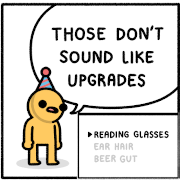|
Mr. Smile Face Hat posted:Very interesting, I have to read up on that. e: Found a story that all such restrictions were lifted in the UK a decade ago, what country are you in? Norway
|
|
|
|

|
| # ? Jun 4, 2024 11:13 |
|
Dante posted:Well, cesium-137 literally raining on western europe as part of the fallout from chernobyl certainly didn't help nuclear energy PR. It made the grass outside my apartment radioactive and farmers to this day have to be careful to not let sheep graze too much. You are aware that many other countries suffered much higher fallout from the Chernobyl disaster? Like Finland and Sweden, for example. Yet only the Germans seem to have absolutely panicked. Also in real world, burning coal as the alternative solution is much more damaging to the environment, atmosphere and people. German nuclear phaseout is killing ~1000 people every year just from additinal pollution. In additon they also create radioactive waste (ash) and they also release such waste to the atmosphere, in fact much more than a regular nuclear reactor. So if the radiation or pollution was actually the reason then they should embrace the nukes and ban coal.
|
|
|
|
Youth Decay posted:https://twitter.com/MrKovalenko/status/1501071619439087617 I really wonder how many AA missiles Ukraine has. Like not MANPADS, I know they have tons of those. I'm talking about traditional AA systems that can knock out high flying aircraft and missiles. I'm guessing they inherited some from the Soviet days but is that the same stock of missiles they are using now?
|
|
|
|
bad_fmr posted:You are aware that many other countries suffered much higher fallout from the Chernobyl disaster? Like Finland and Sweden, for example. Yet only the Germans seem to have absolutely panicked. We are talking about why europeans are in general averse to nuclear power, i.e nuclear energy PR. There's no doubt that the Chernobyl disaster and the fallout from it, combined with the general malaise of living right close to the Sovet Union during the height of the nuclear war tension, are key factors shaping the perception of nuclear energy even today in western europe. To illustrate with an example; Norway is a very outdoorsy nation due to its environment. Picking mushrooms in the forest is a pretty common activity, and there's still 40+ years later areas where you shouldn't pick mushrooms due to radioactivity from Chernobyl accumulating in the mushrooms making them dangerous to eat. Things like this go a looong way towards shaping public perception of nuclear energy. Dante fucked around with this message at 09:06 on Mar 8, 2022 |
|
|
|
Mr. Fall Down Terror posted:some IFVs are also amphibious - the soviets really went hard on swimming vehicles, because there are a ton of wide, slow rivers in eastern europe and no guarantee of intact bridges Do we know if the Russians have used this capability in Ukraine? Can't imagine crossing a river would help with resupply.
|
|
|
|
Dick Ripple posted:How much longer can we argue about who has the most Nazis? I can't find the effortpost where I saw this and cannot repost/link to it for that reason, but some goon made a very insightful point somewhere on these forums a few days ago, namely, pointing out the role of the Soviet victory in WWII/GPW and it's role in the current Russian national mythos. At the risk of misremembering and misrepresenting the point of the very long post, the point was that as a result of the war and the losses the USSR suffered, Russia sees itself as the primary victim of and the primary victor over fascism and as such has over time reframed the definition of fascism to mean anti-Russian, regardless of the actual ideology or motivation of the conflict. Countries and nations that oppose Russia become fascist by default solely due to their anti-Russian stance. That is also why the actual actions, ideology and methods of current day Russia do not really matter, they're not relevant to their definition of fascism. became more anti-Russian, largel Which then creates a situation where a right-wing authoritarian state with imperial ambitions is invading a flawed, but largely functional democracy under the pretext of denazification.
|
|
|
|
MikeC posted:Is there a reason why the Europeans are so averse to nuclear power? In Ontario Canada, nuclear makes up well over half our energy with Hydro making up another quarter. Finland has been quite pro-nuclear but.. The new Olkiluoto 3 plant built by Areva  ? 12 years late and 400% over budget ? 12 years late and 400% over budgetThe new Hanhikivi plant ordered from Rosatom? uncleTomOfFinland fucked around with this message at 09:05 on Mar 8, 2022 |
|
|
|
France is 70% nuclear. I don't know how much gas is used for cooking, but such a huge baseload makes it easier to expand renewables to replace fossil energy use.
|
|
|
|
uncleTomOfFinland posted:Finland has been quite pro-nuclear but.. The issue is market liberalism. All the countries sold their domestic nuclear design and architecture work, And demolished whatever infrastructure was developed for building reactors in like, the late 80s. The UK developed a bunch of reactors, but now we're having to buy in French built versions of Chinese reactors based on designs by America. It's no wonder poo poo is going overbudget and overtime.
|
|
|
khwarezm posted:Its hard for me to ascertain how far Ukraine's neo-Nazi problem goes so I value first hand accounts. Consider getting actual first hand account, instead of someone making poo poo up along Russian propaganda lines. For example, https://twitter.com/redarrow_posts/status/1500936885350375427 Zelenskyi was elected in 2019. This supposedly happened in 2018.
|
|
|
|
|
Dante posted:We are talking about why europeans are in general averse to nuclear power, i.e nuclear energy PR. There's no doubt that the Chernobyl disaster and the fallout from it, combined with the general malaise of living right close to the Sovet Union during the height of the nuclear war tension, are key factors shaping the perception of nuclear energy even today in western europe. But there is no such general aversion in Europe. Mostly just in Germany. Finland just built a new reactor and is building another one. France is investing in building new nukes. The Netherlands have budgeted more for extending their exising plants lifetime. And so on. In spite of what many germans might believe, they do not in fact represent the EU or even the western Europe.
|
|
|
|
Dick Ripple posted:How much longer can we argue about who has the most Nazis? Hungary. There, we can move on now!
|
|
|
|
Drone_Fragger posted:The issue is market liberalism. All the countries sold their domestic nuclear design and architecture work, And demolished whatever infrastructure was developed for building reactors in like, the late 80s. The UK developed a bunch of reactors, but now we're having to buy in French built versions of Chinese reactors based on designs by America. It's no wonder poo poo is going overbudget and overtime. One issue here is that getting new permits for reactors is a political nightmare (thanks greens!) and they are based on the amount of reactors and not on the amount of energy produced. The result of course is that they end up ordering the biggest and the most complicated one (Olkiluoto 3) there is when no-one has been building even small ones for quite a while.
|
|
|
|
with a rebel yell she QQd posted:Hungary. This question should probably go in the Eastern Europe thread, but with elections in less than a month's time, do you see the war shaking things up for Orban?
|
|
|
|
bad_fmr posted:But there is no such general aversion in Europe. Mostly just in Germany. Finland just built a new reactor and is building another one. France is investing in building new nukes. The Netherlands have budgeted more for extending their exising plants lifetime. And so on. The Netherlands have a very strong NIMBY presence blocking any plans for any new nuclear plant plans though. Though opinions are shifting here as well.
|
|
|
|
bad_fmr posted:You are aware that many other countries suffered much higher fallout from the Chernobyl disaster? Like Finland and Sweden, for example. Yet only the Germans seem to have absolutely panicked. Almost all of Europe either never had nuclear plants, is in the middle of a phase out, planning one or has already completed it. The more interesting question seems to be why Finland, the UK and Sweden are so special(France is pretty understandable, since they are exceptionally reliant on nuclear energy).
|
|
|
|
Charliegrs posted:I really wonder how many AA missiles Ukraine has. Like not MANPADS, I know they have tons of those. I'm talking about traditional AA systems that can knock out high flying aircraft and missiles. I'm guessing they inherited some from the Soviet days but is that the same stock of missiles they are using now? Maybe it's less that Ukraine has their AA locked down and more to do with Russia becoming sparse with the cruise missiles.
|
|
|
|
Young Freud posted:Maybe it's less that Ukraine has their AA locked down and more to do with Russia becoming sparse with the cruise missiles. A bit of both IMO. Some of the Ukrainian air defense was destroyed in the beginning, what they are fielding now is probably older stuff that wasn't in the field when the war started. In addition the crew are getting better and they are better placed. Wouldn't surprise me too much if the Russians are launching cruise missiles from the same places towards the same areas, which means they missiles will be flying the same tracks.
|
|
|
|
GABA ghoul posted:Almost all of Europe either never had nuclear plants, is in the middle of a phase out, planning one or has already completed it. The more interesting question seems to be why Finland, the UK and Sweden are so special(France is pretty understandable, since they are exceptionally reliant on nuclear energy). Sweden happens to have a lot of low-grade uranium in the ground. So in the 40's and 50's, Sweden went all in on building nuclear plants using companies owned partly by the state to mine uranium and build nuclear plants. France and Sweden collaborated closely, trading uranium metal for uranium oxide. Basically this was a huge success for Sweden and we were all over nuclear power in the 50s and 60s, building smaller plants, until we ended up with a few bigger industrial plants from mainly the 70's and 80's. Then Chernobyl happened, Sweden got a lot of the fallout due to how the winds carried the radioactive smoke. This led to one of very few referendums in Swedish history, which ended up halting all new plant constructions and an official strategy to phase out nuclear power. To put it on topic for Ukraine, Sweden's heavy use of nuclear and hydro for electricity (still 40% nuclear because yeah we're not going to adhere to no referendums and 40% hydro) means that Russia has very little leverage through oil and natural gas here.
|
|
|
|
bad_fmr posted:Mostly just the Germans. Well, and the swamp Germans in Belgium. Isn't it impossible to stop something from being radioactive once it's created, or am I being a moron? I recall my teacher explain to me that nuclear power is dangerous because even if the plants are decommissioned there's tons of nuclear waste that they won't know what to do with.
|
|
|
|
MikeC posted:Is there a reason why the Europeans are so averse to nuclear power? In Ontario Canada, nuclear makes up well over half our energy with Hydro making up another quarter. Combined with the falling cost of wind and solar, and the fact that gas has historically been cheap and plentiful thanks to both Russia and, from the 1970s, the North Sea, and it's been pretty hard for nuclear power to justify its existence. That's changing now, obviously. And you can argue that wind and solar look artificially cheap because the sticker price doesn't include the backup capacity you need for when the wind isn't blowing and the sun isn't shining (which in practise means more gas plants to act as backup). But economics is a big part of it.
|
|
|
|
Zephro posted:Beyond everything people have said about Chernobyl and the general link between nuclear power and nuclear weapons, there's also cost. There are three big new nuclear power stations under construction in Europe at the moment, at Olkiluoto, Flamanville and Hinkley Point. All are the same design (the EPR) and all are late and over budget. Modern nuclear power plants have gigantic upfront capital costs and are price takers once they're connected to the grid. That makes them very hard to finance without government subsidy. And that's before you start to think about the decommissioning and waste-disposal costs, which are quite likely to fall on future generations of taxpayers who got no benefit from the actual plant itself. Yeah nuclear is not this amazingly cost efficient panacea for energy that some people would like to believe. Building new reactors is a pretty bad idea most of the time if you look at cost, it used to be cheap but that's because renewables used to be way more expensive per kWh just a few years ago.
|
|
|
|
punk rebel ecks posted:Isn't it impossible to stop something from being radioactive once it's created, or am I being a moron? I recall my teacher explain to me that nuclear power is dangerous because even if the plants are decommissioned there's tons of nuclear waste that they won't know what to do with.
|
|
|
|
lilljonas posted:Sweden happens to have a lot of low-grade uranium in the ground. So in the 40's and 50's, Sweden went all in on building nuclear plants using companies owned partly by the state to mine uranium and build nuclear plants. France and Sweden collaborated closely, trading uranium metal for uranium oxide. Basically this was a huge success for Sweden and we were all over nuclear power in the 50s and 60s, building smaller plants, until we ended up with a few bigger industrial plants from mainly the 70's and 80's. Then Chernobyl happened, Sweden got a lot of the fallout due to how the winds carried the radioactive smoke. This led to one of very few referendums in Swedish history, which ended up halting all new plant constructions and an official strategy to phase out nuclear power. Might be worth pointing out that Sweden felt that it had missed out on two industrial revolutions having neither coal or oil. Lack of coal, oil, lubricants and fats played a large part in Swedens questionable neutrality towards Germany during ww2. The embrace of nuclear power got hit by Three Mile Island then Chernobyl and when the seemed to be a chance for it to come back again Fukushima.
|
|
|
|
lilljonas posted:Yeah nuclear is not this amazingly cost efficient panacea for energy that some people would like to believe. Building new reactors is a pretty bad idea most of the time if you look at cost, it used to be cheap but that's because renewables used to be way more expensive per kWh just a few years ago. On the other hand, nuclear is amazingly cost-efficient if you look at the effect it has on reducing the collective cost per kWh during periods of low output from renewables. Power-to-X is so horrendously inefficient at this point in time, that a full transition to renewables would have a very different average cost per kWh. Even though nuclear output isn't as static as some claim, it still is quite inflexible, and getting the balance between renewables and nuclear right is not easy - so ideally Europe should coordinate reactor construction much more and sign binding agreements on shared responsibility. But from a holistic point of view, renewables + nuclear is far more cost effective than either in isolation. Until power-to-X becomes more efficient, building new reactors is the only alternative to a continued reliance on fossils, and by extension, oil and gas. It's somewhat frustrating to see a very simplistic (and this is not aimed at you, but at lobbyist and politicians) kWh price comparison being thrown around as if it was a static metric. The EU regulated power market has the effect of making energy prices seem more stable than they are, and also obfuscates the actual cost (grossly simplified the marginal kWh price is determined by the most expensive supplier rather than the cheapest).
|
|
|
|
Deteriorata posted:Another dawn is breaking in Kyiv, and it's still Ukrainian. Bless you.
|
|
|
|
Antillie posted:All those "Z"'s painted on all their crap are more than just a way of marking what tanks/trucks/things are theirs vs not theirs. (Z is not in the Cyrillic alphabet) Its represents a quasi political movement. The swastika filled the same role in Germany once upon a time, albeit in a slightly more overt manner. Z is just half of a swastika when you think about it. 
|
|
|
|
GABA ghoul posted:Almost all of Europe either never had nuclear plants, is in the middle of a phase out, planning one or has already completed it. The more interesting question seems to be why Finland, the UK and Sweden are so special(France is pretty understandable, since they are exceptionally reliant on nuclear energy). Britain pursued nuclear power in the 1940s and 1950s because it wanted plutonium for its bomb project and why not generate some electricity while you're making it? That was the origin of the Magnox design. It kept going with nukes in the 1960s because the White Heat Of Technology™ was going to be what saved the country and, of course, nuclear power is the future!. The AGR reactors were built in the hope of winning export orders, though in the end they didn't. The third generation was intended to be built to replace the first, but only one power station was actually built because by that time Britain was swimming in oil and gas and well on its way to becoming an actual petro-state, so why bother with nuclear? The liberalisation of the electricity market stopped any nukes being built for decades because they're economically unsuited. Giant upfront capital costs and little ability to ramp up and down depending on the wholesale price. Instead a combination of North Sea gas and liberalisation meant the country built a load of gas plants instead. A jet engine in a shed is cheap to build and can follow the price of power up and down. A mix of climate-change worries and fears that Britain is too reliant on gas means there's been attempts to revive nuclear over the past 20 years. But the only reactor actually under construction - at Hinkley Point - is widely seen as a mess because it's late and over-budget and required government subsidies for the next 30 year to get EDF to invest. The government are looking at smaller reactors as an alternative and I suspect the whole nuclear revival will be given wings by Ukraine, but let's see. tl;dr: bombs; exports; the North Sea; climate change; energy security Zephro fucked around with this message at 10:21 on Mar 8, 2022 |
|
|
|
Dante posted:We are talking about why europeans are in general averse to nuclear power, i.e nuclear energy PR. There's no doubt that the Chernobyl disaster and the fallout from it, combined with the general malaise of living right close to the Sovet Union during the height of the nuclear war tension, are key factors shaping the perception of nuclear energy even today in western europe. To illustrate with an example; Norway is a very outdoorsy nation due to its environment. Picking mushrooms in the forest is a pretty common activity, and there's still 40+ years later areas where you shouldn't pick mushrooms due to radioactivity from Chernobyl accumulating in the mushrooms making them dangerous to eat. Things like this go a looong way towards shaping public perception of nuclear energy. I'm sorry for derailing the thread a bit, but do you have a source for the bolded part? The reason I'm asking is that the Finnish food safety authorities haven't advised for any restrictions on mushrooms for years now. According to their studies, a Finn eating 6 kg of mushrooms per year, with most of them being species that have the highest cesium concentrations, will gain an extra 40 Afaik in Finland the only place you can find cesium concentrations over the EU limit for natural products (600 Bq/kg) is predatory fish in certain areas thanks to accumulation via the food chain. Reindeer meat can also have high concentrations, but as a "fun" fact most of that is from nuclear weapons tests in the atmosphere in Russia in the 50s and 60s Qtamo fucked around with this message at 10:17 on Mar 8, 2022 |
|
|
|
Dante posted:We are talking about why europeans are in general averse to nuclear power, i.e nuclear energy PR. There's no doubt that the Chernobyl disaster and the fallout from it, combined with the general malaise of living right close to the Sovet Union during the height of the nuclear war tension, are key factors shaping the perception of nuclear energy even today in western europe. To illustrate with an example; Norway is a very outdoorsy nation due to its environment. Picking mushrooms in the forest is a pretty common activity, and there's still 40+ years later areas where you shouldn't pick mushrooms due to radioactivity from Chernobyl accumulating in the mushrooms making them dangerous to eat. Things like this go a looong way towards shaping public perception of nuclear energy. This is the mushroom info thread, right? Anyway I was curious because I've heard of this before, but despite living with a mushroom woman for a couple years and having a good friend who is a mushroom man and mushrooming with both, this never came up and even taking mushrooms to be checked at the mushroom centers in Switzerland, they never like... waved a geiger counter in front of them or whatever one would do. I was able to find a pretty decent breakdown for Switzerland https://books.google.ch/books/?id=Y...shrooms&f=false "In 2002, bay boletes showed radiocaesium levels of 33 to 23,200 Bq/kg and porcini from 6 to 10,000 Bq/kg. In 2015, activities were reduced remarkably in boletes to 13 to 900...and porcini 4 to 108." 23,200 Bq/kg sounds pretty high but... let's calculate. The maximum "safe" radiation exposure for nuclear workers is apparently about 50 mSv/year and apparently 3 mSv/yr for general public? Consumption of 80,000 bq is about 1 mSv ( https://www.bfs.de/EN/topics/ion/environment/foodstuffs/mushrooms-game/mushrooms-game_node.html ), so...if you ate 175 kg of fresh mushrooms picked in the worst spot in Switzerland per year, that would equal the maximum "safe" exposure. And...10 kg to get the maximum safe "normal person" exposure limit. So it seems like mushroom radiation is... "not great, not terrible." Although maybe it's two orders of magnitude higher in some places in Scandinavia than in Switzerland. Qtamo posted:I'm sorry for derailing the thread a bit, but do you have a source for the bolded part? The reason I'm asking is that the Finnish food safety authorities haven't advised for any restrictions on mushrooms for years now. According to their studies, a Finn eating 6 kg of mushrooms per year, with most of them being species that have the highest cesium concentrations, will gain an extra 40 mSv of radiation per year. Which in turn is about 1 % of the average radiation dose a Finnish person gets from other sources, mostly background radiation. I'm just wondering if Norway is stricter in their guidelines, has less background radiation or if they had more of the fallout. Haha, looks like you and I were on the same topic here at the same time. E: I think you're quite off on the 40 mSv/yr radiation only being 1% of normal exposure. I think 40 mSv is like 1% of a *lifetime* dose. (E2: Actually more like 8%? Seems like "normal person" lifetime exposure is around 500 mSv; https://www.energy.gov/sites/prod/files/2016/09/f33/Radiation_in_Perspective.pdf and maybe 1500 mSv for a lifetime for nuclear workers, e.g. https://www.rosenergoatom.ru/en/safety-&-ecology/nuclear-and-radiation-safety/radiation-exposure-of-npp-personnel-and-visiting-specialists/). That said I see quite variable numbers for average annual exposure. The US source is saying ~6-7 mSv/yr, or ~500 mSv for 70 years, whereas the Russian site says 70 mSv/70 year lifetime. Maybe someone more knowledgable can pitch in, beyond my 30 min of Google and vague memory of college physics. Saladman fucked around with this message at 10:24 on Mar 8, 2022 |
|
|
|
GABA ghoul posted:Almost all of Europe either never had nuclear plants, is in the middle of a phase out, planning one or has already completed it. The referendum happened in 1980. Chernobyl was in 1986. It was entirely initiated by the 1979 Three Mile Island accident, on top of an underlying tension in Swedish politics over nuclear power. GABA ghoul posted:The more interesting question seems to be why Finland, the UK and Sweden are so special(France is pretty understandable, since they are exceptionally reliant on nuclear energy). This 100 % ^^^ Sweden had fully exploited its politically viable hydroelectrical potential by the time commercial nuclear plants not part of a larger defense strategy started getting built. Completely done. At only 50 % of current Swedish electric consumption. The remaining 50 % had to come from somewhere that wasn't hydroelectric. Nobody remembers Rädda Älvarna; everybody remembers the referendum. Germany and the Netherlands knew they'd never really have to deal with consequences of rejecting nuclear power. At the end of the day, domestic coal (DE) and gas (NL) would be there when nuclear power had to be cut for political purposes. Sweden had no such resources, and when presented with a referendum where all three alternatives were to shut down the country's nuclear power, the majority of the public chose the least shutty-downy. And the government chose to set "policies" that decommissioned the plants in the impossibly distant future.
|
|
|
|
The correct unit of radiation exposure is the Banana Equivalent Dose, which is about 1 micro-sievert So eating a fifth of a ton of Switzerland's finest nuke-shrooms is about the same as eating three bananas a day for year
|
|
|
|
Also worth mentioning some countries used nuclear explicitly for fuel breeding. You need developed civil nuclear infrastructure to breed plutonium for nuclear weapons and more elaborate uses like spacecraft RTGS. Hence countries that wanted their own nukes went Into nuclear power heavily, And why it's still a touchy subject letting some countries have civil nuclear reactors.
|
|
|
|
Saladman posted:Haha, looks like you and I were on the same topic here at the same time. E: You're off on the 40 mSv/yr radiation only being 1% though. 40 mSv is like 1% of a *lifetime* dose. Whoooops, I mistyped micro as m, good catch! Edited the post.
|
|
|
|
Qtamo posted:I'm sorry for derailing the thread a bit, but do you have a source for the bolded part? The reason I'm asking is that the Finnish food safety authorities haven't advised for any restrictions on mushrooms for years now. According to their studies, a Finn eating 6 kg of mushrooms per year, with most of them being species that have the highest cesium concentrations, will gain an extra 40 Here's an article from 2020, seems to google translate ok-ish although "children" somehow becomes "pups" haha. Perhaps Google sees Norwegians as a subspecies of seal. https://www.nrk.no/innlandet/fleire-plassar-i-landet-ma-ein-teste-soppen-for-radioaktivitet-_-pa-grunn-av-tsjernobyl-1.15141392 tl;dr not great, not terrible
|
|
|
|
Qtamo posted:I'm sorry for derailing the thread a bit, but do you have a source for the bolded part? The reason I'm asking is that the Finnish food safety authorities haven't advised for any restrictions on mushrooms for years now. According to their studies, a Finn eating 6 kg of mushrooms per year, with most of them being species that have the highest cesium concentrations, will gain an extra 40 Don't know about mushrooms, although I eat them a lot in Autumns. I do remember attending a seminar where some lake scientist explained how 99% of the Chernobyl isotopes of the Saimaa catchment are still in the bottom mud. Of course a lot has transmuted on the way, but they have not gone any further. He just said that it is not a problem unless somebody wants to use the mud for something.
|
|
|
|
Saladman posted:This is the mushroom info thread, right? Anyway I was curious because I've heard of this before, but despite living with a mushroom woman for a couple years and having a good friend who is a mushroom man and mushrooming with both, this never came up and even taking mushrooms to be checked at the mushroom centers in Switzerland, they never like... waved a geiger counter in front of them or whatever one would do. I was able to find a pretty decent breakdown for Switzerland https://books.google.ch/books/?id=Y...shrooms&f=false tbh eating 175 kg of fresh mushrooms (assuming Swiss phenology this is spread over 3 months so about 1,9 kg of fungi per day) has a good chance of inducing rhabdomyolysis (can be fatal) and, depending on soil chemistry and site, potentially give you waaay too much heavy metals or mercury when you're eating hundreds of kilograms of fungi per year the radiation is like the least of your worries
|
|
|
|
punk rebel ecks posted:Isn't it impossible to stop something from being radioactive once it's created, or am I being a moron? I recall my teacher explain to me that nuclear power is dangerous because even if the plants are decommissioned there's tons of nuclear waste that they won't know what to do with. Yeah as already mentioned you put it in a container and wait. For a looong time for some materials. But spent nuclear material can also be reprocessed and reused. That way you could significantly reduce the amount of waste created. This of course adds to the expense so right now it is not really done. But if the amount of waste would be the actual problem then reprocessing could of course be mandated. Coal powerplants also create radiactive ash as waste and spew it into the atmosphere. It is estimated that all the coal plants in the world cause something like 100 times the radiation dumped in the environment than all the nuclear plants. Plus all the other harmful particles, and the CO2.
|
|
|
|
Yeah one reason nuclear is so expensive is people are extremely anal about even the tiniest amount of radioactivity escaping the plant, but are much happier to live near a coal plant that spews uranium and thorium (both of which are radioactive) and all sorts of other toxic crap directly into the atmosphere as long as it's running  edit: basically one of nuclear's biggest problems is it has to actually account for its waste products whereas fossil fuel plants can just dump that poo poo straight into the air and never mind all the consequences from pollution, lung cancer and planet-heating
|
|
|
|

|
| # ? Jun 4, 2024 11:13 |
|
Also the best part about nuclear power is that coal fly ash is more radioactive than most nuclear waste and unlike nuclear waste is stored in giant open air pits where it can dry out and blow everywhere or get washed into rivers and groundwater supplies.
|
|
|




 Perhaps the tide is turning for the better in Kiev?
Perhaps the tide is turning for the better in Kiev?






























